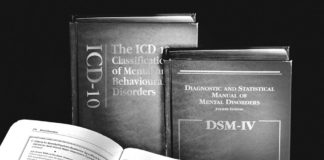Tag: peter kinderman
Moving Mental Health Work Away from Diagnosis: Sarah Kamens and Peter...
MIA's Justin Karter interviews two leaders of the Task Force on Diagnostic Alternatives, a group of mental health professionals who have issued an open letter demanding a new look at psychiatric diagnosis.
Peter Kinderman – Why We Need a Revolution in Mental Health...
An interview with Professor Peter Kinderman about his new book, A Manifesto for Mental Health, Why We Need a Revolution in Mental Health Care, in which he proposes a rejection of invalid diagnostic labels, practical help rather than medication, and a recognition that distress is usually an understandable human response to life's challenges.
Psychosocial Adversities Should be Included in Diagnosis
Proposal to include psychosocial adversities that impact mental health in ICD and DSM diagnoses.
Beyond Critique: Psychologists Discuss Diagnostic Alternatives
The Journal of Humanistic Psychology compiles diverse research offering diagnostic alternatives toward a paradigm shift in mental health care.
“Politicians and Experts Meet at Parliament to Explore Record Antidepressant Prescribing...
The All-Party Parliamentary Group for Prescribed Drug Dependence is meeting today, May 11th, to discuss evidence of the link between the rise in disability...
“Mental Illness Mostly Caused by Life Events Not Genetics, Argue Psychologists”
According to psychologists, “mental illness is largely caused by social crises such as unemployment or childhood abuse.” If this is so, why are we...
British Medical Association Takes On Prescription Drug Dependence
Last year the British Medical Association (BMA) released a report on dependence and withdrawal from prescription drugs including benzodiazepines, z-drugs, opioids, and antidepressants. Now,...
“Why We Need to Abandon the Disease-Model of Mental Health Care”
In a guest blog for the Scientific American, Peter Kinderman takes on the “harmful myth” that our more distressing emotions can best be understood as symptoms of physical illnesses. “Our present approach to helping vulnerable people in acute emotional distress is severely hampered by old-fashioned, inhumane and fundamentally unscientific ideas about the nature and origins of mental health problems.”













